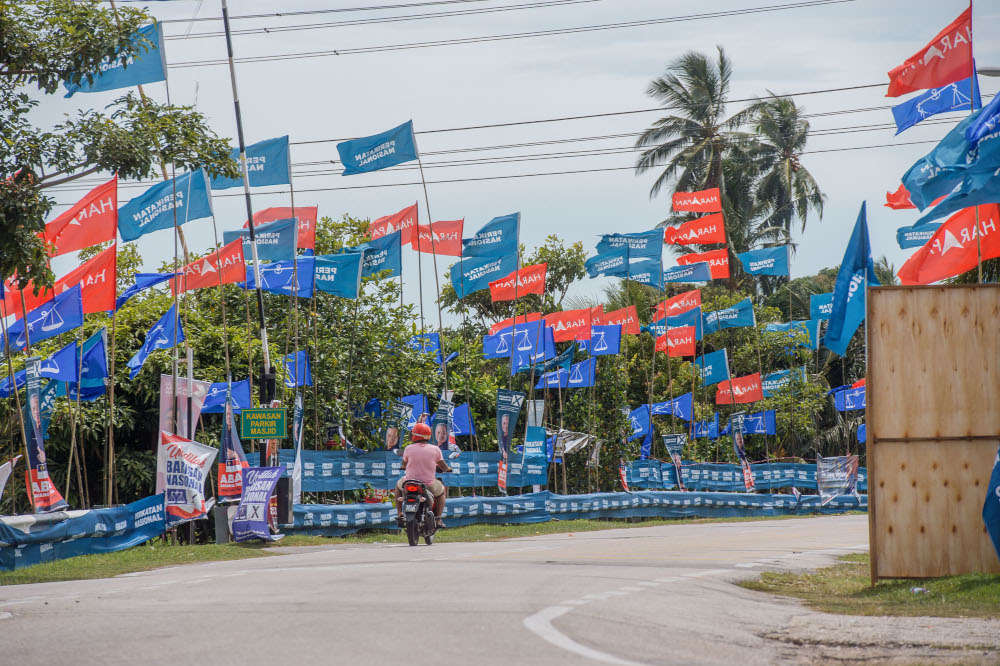MELAKA, Nov 19 — Melaka will head to the ballot boxes tomorrow, after nearly two weeks of campaigning for a premature state election that was forced by just four lawmakers.
The first major election to be held in the country alongside the Covid-19 pandemic, the Melaka poll was triggered when the four assemblymen rejected Datuk Seri Sulaiman Md Ali as the chief minister.
The four are Datuk Seri Idris Haron (former Sungai Udang assemblyman), Datuk Nor Azman Hassan (Pantai Kundor), Datuk Noor Effandi Ahmad (Telok Mas) and Datuk Norhizam Hassan Baktee (Pengkalan Batu).
Both Nor Azman and Idris are from Umno, Sulaiman’s own party. Due to their action, they were both expelled the same day.
Prior to October 4 announcement, rumours were rife that all four assemblymen had met with Pakatan Harapan (PH) chairman Datuk Seri Anwar Ibrahim, which led to Melaka Barisan Nasional chief Datuk Seri Ab Rauf Yusoh blaming the coalition for the collapse of the state government.
Political frogs heading to the elections
Prior to the dissolution of the state assembly, the Perikatan Nasional (Perikatan) state government controlled 17 out of 28 state seats.
On October 4, Yang Dipertua Negeri Melaka Tun Mohd Ali Rustam announced that the 14th Melaka state assembly session was dissolved, which was gazetted officially on October 5.
This led to the PH presidential council to issue a statement lambasting Ali for his supposed error, and claiming he should have met with its 15 lawmakers before making his decision.
On November 6, Anwar then announced that both Idris and Nor Azman Hassan would be contesting under PH.
Idris, who is a former Melaka chief minister and Sungai Udang assemblyman, will be contesting in the Asahan state seat.
As for Nor Azman, he will be defending his Pantai Kundor state seat, which is under Amanah.
PH component party, DAP, prior to the announcement by Anwar, had reiterated their stance against the coalition for supporting any of these “traitors” in the state election.
However, DAP national organising committee secretary Anthony Loke revealed that his party was outvoted by other PH parties to field both controversial figures in the state elections.

Three coalitions engage in maiden battle
The Melaka state election is also the first time the country’s three main political coalitions — BN, PH, and PN — will all contest independently, likely drawing the battle lines heading into the 15th general election.
Despite BN and PN being nominally allied at the federal level, the three coalitions were contesting in all 28 seats, creating at least three-cornered fights in all, not counting other independent candidates or splinter parties contesting in the elections.
As PH has been consistent in its messaging for voters to elect a “clean” government, the focus has consequently been on PN’s main party, Bersatu, and BN lynchpin party Umno.
During the campaign period, PN chairman Tan Sri Muhyiddin Yassin sought to position his coalition on the moral high ground by saying he chose not to act recklessly when he resigned as the prime minister rather than calling for a general election amidst a pandemic.
Muhyiddin then accused so-called ally Umno of causing the instability in Perak and snubbing Bersatu for the chief minister’s post in Melaka, before noting he could have retaliated in Johor where his party controlled 11 seats in the state assembly.
This culminated in a row between the Pagoh MP and former Johor Baru MP Tan Sri Shahrir Samad from Umno and other party leaders.
However, PN’s message throughout the campaign period has been that of fighting against corruption and abuse of power, distancing itself from scandal ridden Umno.
PH has maintained that it wanted Adly Zahari as its nominee for the chief minister post, while BN has named Datuk Seri Sulaiman Md Ali as its choice and Perikatan has named Datuk Mas Ermieyati Samsudin as its candidate.

Campaigning under new norms
On October 24, the Ministry of Health announced a ban on all political gatherings and social events linked to the election from October 25 till November 27.
Health Minister Khairy Jamaluddin cited the Prevention and Control of Infectious Diseases Act 1988, also known as Act 342, for the prohibition.
He said this stance is also in line with the prohibited activities listed under Phase Four of the National Recovery Plan (NRP).
In accordance with the ban, on November 8, the Election Commission (EC) issued its list of dos-and-don’ts for political campaigning in the Melaka state polls, where prohibited activities now include walkabouts and ceramah.
This drew a slew of responses from all political coalition stating the ban will diminish their ability to engage with voters and subsequently canvas for votes.
However, the campaign was primarily reduced to meet and greets, with some candidates or even organisers being fined for violating the restrictions.
The campaigns are mostly being fought online with all political parties and candidates are hosting online talk shows, posting daily updates of short videos and messages to engage with voters.
It is likely that the EC will use Melaka as a yardstick on how future elections are held as the country enters the endemic stage. - malaymail




No comments:
Post a Comment
Note: Only a member of this blog may post a comment.